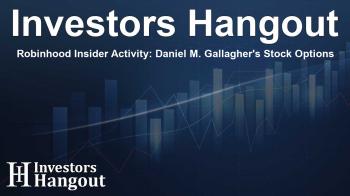Robinhood Insider Activity: Daniel M. Gallagher's Stock Options

Recent Insider Activity by Daniel M. Gallagher, Jr.
A noteworthy insider transaction came to light recently as Daniel M. Gallagher, Jr., the Chief Legal Officer at Robinhood Markets (NASDAQ: HOOD), initiated the exercise of a significant number of stock options. This activity marks an important moment in the context of Robinhood's corporate landscape and stock interactions.
Understanding the Exercise of Stock Options
Gallagher exercised stock options totaling 79,295 shares at an exercise price of $10.24 each. This activity was formally reported in a filing submitted to the U.S. Securities and Exchange Commission. With Robinhood’s shares currently trading at approximately $47.50, this stock options exercise translates to a valuation of about $2.95 million for Gallagher. It showcases a confident signal towards the company's future trajectory amidst fluctuating market sentiments.
Exploring Robinhood Markets' Unique Proposition
Robinhood Markets Inc prides itself on creating a modern financial services platform aimed at democratizing investing. They utilize a unique, app-based cloud platform that integrates various financial products and services directly accessible through proprietary technology. Their innovative approach includes features such as cryptocurrency trading, fractional shares, dividend reinvestments, and diversified investment options, which are designed to enhance investor accessibility.
Financial Performance of Robinhood Markets
When assessing the financial health of Robinhood Markets, several indicators stand out. The company has displayed impressive revenue growth, achieving a remarkable growth rate of 115.29% for the latest reporting period. This performance not only illustrates the company’s robust financial foundation but also demonstrates its ability to outperform many competitors within the financial services sector.
Analyzing Key Profitability Metrics
Profitability is another cornerstone of Robinhood’s financial assessment. The company boasts an impressive gross margin of 85.8%, indicative of its effective cost management strategies and competitive positioning. However, it faces challenges, reflected in an earnings per share (EPS) figure of 1.04, which remains below the industry average.
Debt Management and Valuation Metrics
On the debt management side, Robinhood maintains a solid debt-to-equity ratio of 0.94. This figure places it favorably within the industry context, demonstrating prudent financial management. When it comes to valuation, Robinhood’s Price-to-Earnings (P/E) ratio stands at 31.99, which is higher than many of its industry counterparts. This suggests that market participants may perceive the stock as slightly overvalued, reflecting cautious sentiment about future performance.
Insights on Market Capitalization
In terms of market capitalization, Robinhood’s position indicates a substantial presence within the financial services sector, enhancing its visibility among investors and stakeholders. This robust capitalization further cements its stature in an increasingly competitive market landscape.
Significance of Insider Transactions
The analysis of insider transactions is crucial for investors aiming to make informed decisions. Insider activity often reflects the expectations of company executives regarding future stock performance. A recent purchase by an insider can signal optimism, while a sell could be interpreted differently depending on various market factors. It is essential for investors to contextualize these transactions to gauge overall market sentiment appropriately.
Transaction Codes and their Implications
Understanding the implications of transaction codes reported in Form 4 filings can empower investors. For instance, a 'P' code indicates a purchase while 'S' represents a sale. Equally, the 'C' code signals the conversion of an option. Investors typically pay careful attention to these activities to identify potential shifts in market dynamics following such transactions.
Frequently Asked Questions
What triggered the recent insider activity at Robinhood?
Daniel M. Gallagher, Jr. exercised stock options, indicating a significant transaction reflecting his confidence in the company's future.
What financial indicators reflect Robinhood's performance?
The company has exhibited strong revenue growth at 115.29% and a gross margin of 85.8%, showcasing effective financial management.
How does Robinhood manage its debt?
Robinhood maintains a debt-to-equity ratio of 0.94, demonstrating a sound financial structure compared to industry peers.
Is Robinhood's stock considered overvalued?
With a P/E ratio of 31.99, some analysts suggest that Robinhood's stock may be perceived as slightly overvalued based on market sentiment.
Why are insider transactions important for investors?
Insider transactions provide insights into executives' expectations for company shares, helping investors gauge future market behavior.
About The Author
Contact Hannah Lewis privately here. Or send an email with ATTN: Hannah Lewis as the subject to contact@investorshangout.com.
About Investors Hangout
Investors Hangout is a leading online stock forum for financial discussion and learning, offering a wide range of free tools and resources. It draws in traders of all levels, who exchange market knowledge, investigate trading tactics, and keep an eye on industry developments in real time. Featuring financial articles, stock message boards, quotes, charts, company profiles, and live news updates. Through cooperative learning and a wealth of informational resources, it helps users from novices creating their first portfolios to experts honing their techniques. Join Investors Hangout today: https://investorshangout.com/
The content of this article is based on factual, publicly available information and does not represent legal, financial, or investment advice. Investors Hangout does not offer financial advice, and the author is not a licensed financial advisor. Consult a qualified advisor before making any financial or investment decisions based on this article. This article should not be considered advice to purchase, sell, or hold any securities or other investments. If any of the material provided here is inaccurate, please contact us for corrections.

